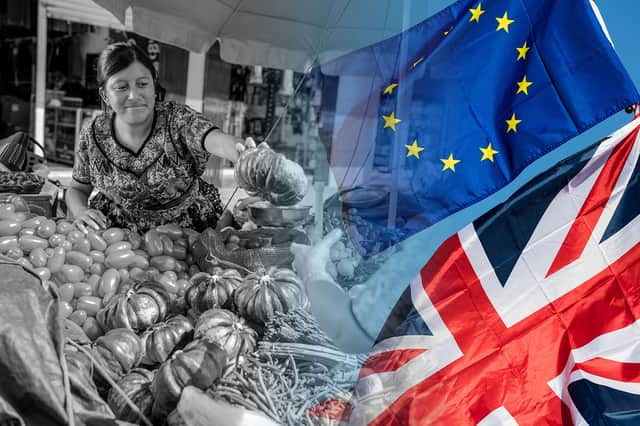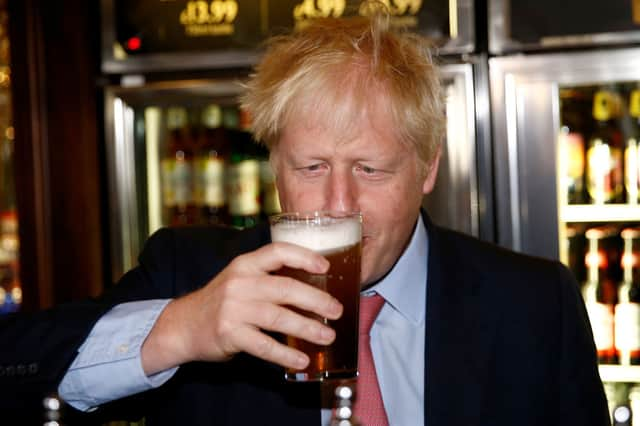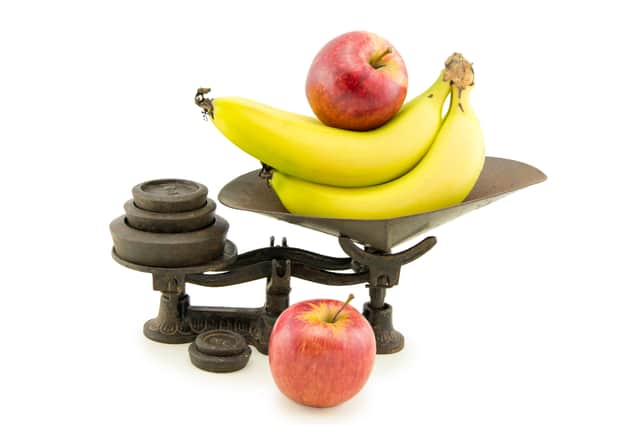Brexit: government ditches Boris Johnson's return to imperial measures with 98.7% of people against it
and live on Freeview channel 276
The government has ditched Boris Johnson's post-Brexit plan to allow shops to only sell products in pounds and ounces after a consultation found 98.7% were against it.
The return to imperial measurements - which includes pints, feet and furlongs - was one of Johnson's promised big Brexit dividends. EU law had previously stated that traders had to display fresh produce with metric weights more prominently than pounds and ounces.
Advertisement
Hide AdAdvertisement
Hide AdJohnson announced a consultation on the return to imperial measurements to much fanfare last year. Coinciding with the Queen's Platinum Jubilee, he said that after Brexit he wanted to bring back the "ancient liberty" of allowing shops which measurement to use.
However, following a survey of more than 100,000 consumers, academics and businesses only just over 1% was in favour of the return of imperial measures. The government said that "consumer confusion, increased costs for businesses and barriers to international trade" were the key issues, along with the "overwhelming response against the increased use of imperial measures".


Metric measurements are far more simple and easier to convert. While 16 ounces make a pound and 1,760 yards form a mile, kilometres and kilograms are 1,000 metres and grams. The Department for Business and Trade however has announced it will be allowing shops to sell pint-sized bottles of wine "thanks to new freedoms from leaving the EU".
Minister for Enterprise, Markets and Small Business Kevin Hollinrake said: "Innovation, freedom and choice – that’s what today’s announcement gives to producers and consumers alike. Our exit from the EU was all about moments just like this, where we can seize new opportunities and provide a real boost to our great British wineries and further growing the economy."


What are imperial measurements?
Advertisement
Hide AdAdvertisement
Hide AdThe metric system includes measurements such as centimetres, metres, kilometres, grams, kilograms, millilitres and litres, and makes more logical sense. There are 1,000 metres in a kilometre and 1,000 grams in a kilogram. The decimalisation also means that units are coherent with one another, and conversions are made much easier.
Imperial measures are less intuitive so 16 ounces make a pound, while 12 inches make a foot and 1,760 yards make a mile.


What are the current rules around measurements?
The UK has used a mix of imperial and metric measurements for decades, despite being in the EU for many years. Speed limits are in miles per hour rather than kilometres, and milk and beer are bought in pints.
Advertisement
Hide AdAdvertisement
Hide AdHowever, supermarket food packaging is mainly grams, while most soft drinks and other liquids on shop shelves are sold in litres. In 2000, the EU weights and measures directive came into force, meaning that traders were legally required to use metric units for sale-by-weight or the measure of fresh produce.
Some shop owners were initially prosecuted for failing to adhere to the new rules, which led to them being labelled as “metric martyrs” by the press. A looser interpretation of the directive was later introduced. It remains legal to price goods in pounds and ounces but they have to be displayed alongside the price in grams and kilograms and in less prominent fashion.
There are exceptions to this rule, which includes pints of draught beer or cider, a pint of milk and the troy ounce for precious metals.
Ralph Blackburn is NationalWorld’s politics editor based in Westminster, where he gets special access to Parliament, MPs and government briefings. If you liked this article you can follow Ralph on X (Twitter) here and sign up to his free weekly newsletter Politics Uncovered, which brings you the latest analysis and gossip from Westminster every Sunday morning.
Comment Guidelines
National World encourages reader discussion on our stories. User feedback, insights and back-and-forth exchanges add a rich layer of context to reporting. Please review our Community Guidelines before commenting.
